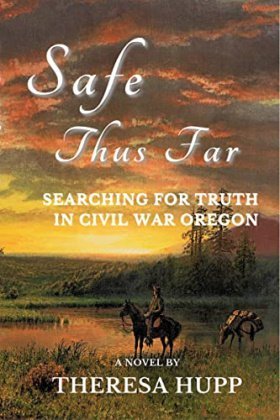“Still homesick?” Will asked as he took off his boots.
“Some.” Jonah sighed. “I hope Iris ain’t forgot me. Hope she ain’t found another fella.”
“If she loves you, she won’t forget you.” Will didn’t know that for sure, but that’s what people wrote in the novels Mama read. And he felt sure that Mama and Maria had not forgotten him.
“She don’t even know where I am,” Jonah said. “No one does but you and Joel.”
“Write a letter home,” Will said. “Drew is sending a messenger to Fort Klamath tomorrow. He told me so tonight.”
“Really?” Jonah sat up at that.
“Do you want some paper and a quill and ink?” Will asked.
“Are you gonna you write home?” Jonah asked, taking what Will offered.
Will swallowed. “Why not?” he said. Mama deserved to know where he was.
After Jonah finished a letter to Esther, Will took another piece of paper and the pen and ink and wrote:
July 25, 1864
Dear Mama,
He decided to send the letter only to Mama, because he didn’t know how to address Mac.
I am safe with the First Oregon Cavalry Militia, led by Lt. Col. Charles Drew. We are exploring the region between Fort Klamath and Fort Boise. I do not know when we will return to Fort Klamath, but I shall let you know when we arrive. Jonah and I are with his brother Joel. We have hired on as mule packers with the expedition. I also serve as Lt. Col. Drew’s scribe for many of his notes and letters.
My love to you and the rest of the family,
Will

Early on July 26, Drew called Will to his tent again to pack up the papers they’d written thus far.
“I have letters from my friend and me to our families,” Will said. “May I enclose those in the packet to Fort Klamath?”
Drew nodded. “Ask around to see if any other men have correspondence. This will be their last opportunity to communicate until we reach Boise. There’s little between here and there, and we do not know our route.”
When Will had completed this task, he handed the mail packet to the two soldiers heading to Fort Klamath, and they rode away. Will stared after them. In part, he wished he were returning with them. In part, he wished he’d kept his whereabouts to himself. What would happen when Mama and Mac learned where he and Jonah were?
The expedition and the wagons they guarded traveled twelve miles that day, ending at Cow Head Lake, higher in the mountains toward Boise. Their route was circumscribed by what grade the wagons could climb. Drew relied on the Indian scouts who preceded them to mark the trail. The land became increasingly dry and the vegetation sparser. Some water trickled through gullies, but this late in the season, only small mountain lakes like Cow Head held enough water for all their animals.
When Jonah told Joel they had written home, Joel chortled. “Writin’ home like mamas’ boys.” Then he sobered. “Good for you, lads. I shoulda made you write home afore we left Klamath. Esther’n Daniel will be glad to know where Jonah is. And you,” he said to Will, “I know your parents care about you.”
“Mac doesn’t care,” Will muttered. “He’s glad to see me gone, I’ll bet.”
“That ain’t true,” Joel said. “Why, I never seen a pa so proud to have a son.”
“What do you mean?” Will asked. How would Joel know how Mac felt?
“I was there when you was born,” Joel said. “At Whitman Mission. Mac detoured the wagons to Whitman, just so Miz Jenny’d be comfortable. He stayed with her all through your birthin’—him, and Doc and Miz Tuller with him.”
“He detoured the wagons?” Will knew he’d been born at Whitman Mission, but he’d never heard that Mac took the wagons to the mission so he’d be born there.
“Yes, indeed. And then when you come, he carried you out so we all could see you.” Joel guffawed. “He weren’t too comfortable holdin’ a baby and passed you off to some woman soon enough. But he was so proud he almost popped his buttons. And don’t you ever think otherwise.”
What a show Mac put on about a baby who wasn’t even his, Will thought, uncertain whether to believe Joel.
Chapter 41: Guano Lake
The little valley around Cow Head Lake offered good spring water and plentiful grass for the horses, mules, and cattle. They camped on the lake for three days, while Drew and his scouts made more forays into the hills around the valley.
Jonah and the other packers lolled in camp or hunted and fished, but Will got no respite. Drew commanded his presence on the scouting trips.
“Signs of Indians all around us,” Drew said one afternoon as they rode through the dry hills. “Though we haven’t seen a single one.”
The lead Klamath scout confirmed, “Plenty sign other tribes. Maybe Paiute. Maybe Chief Paulina’s people.”
Drew swore. “Why do you think it’s Paulina?”

























